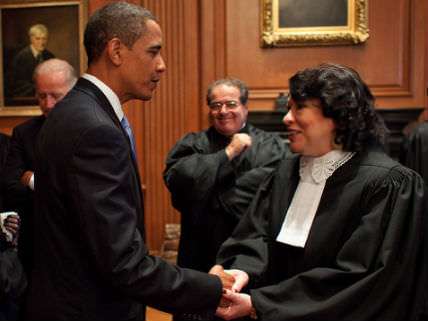Sotomayor to Justice Department Lawyer: 'We Can't Keep Bending the Fourth Amendment to the Resources of Law Enforcement'
Sonia Sotomayor stands up for the Fourth Amendment in drug-sniffing dog case.

The Supreme Court heard oral argument yesterday in the Fourth Amendment case Rodriguez v. United States. At issue is whether an officer "unnecessarily prolonged" an otherwise legal traffic stop when he called for backup in order to safely walk a drug-sniffing dog around the stopped vehicle. According to a previous Supreme Court ruling, the use of drug dogs during routine traffic stops poses no constitutional problems so long as the traffic stop is not "prolonged beyond the time reasonably required to complete that mission."
According to Justice Department lawyer Ginger Anders, who argued yesterday in defense of the police, law enforcement is entitled to wide leeway when it comes to determining the amount of time that's "reasonably required" to conduct traffic stops.
But that argument met with strong resistance from several members of the Court, particularly Justice Sonia Sotomayor. Indeed, Sotomayor went so far as to suggest that the Court's recent Fourth Amendment jurisprudence was flying off the rails due to its pro-police deference. Here's a sample of what Sotomayor told the government lawyer:
I have a real fundamental question, because this line drawing is only here because we've now created a Fourth Amendment entitlement to search for drugs using dogs, whenever anybody's stopped. Because that's what you're proposing. And is that really what the Fourth Amendment should permit?
…we can't keep bending the Fourth Amendment to the resources of law enforcement. Particularly when this stop is not—is not incidental to the purpose of the stop. It's purely to help the police get more criminals, yes. But then the Fourth Amendment becomes a useless piece of paper.
This was not Sotomayor's first such defense of the Fourth Amendment. In fact, just last month she cast a lone dissent in Heien v. North Carolina, in which the Court's majority held that an erroneous traffic stop caused by a police officer's "mistake of law" did not amount to an unreasonable search and seizure. Yet as Sotomayor observed in dissent, "police stopped Heien on suspicion of committing an offense that never actually existed." The officer was wrong about the very law he was sworn to uphold. "One is left to wonder," Sotomayor wrote, "why an innocent citizen should be made to shoulder the burden" of such police mistakes.


Show Comments (169)